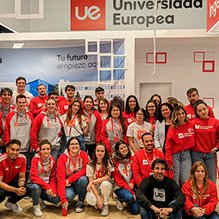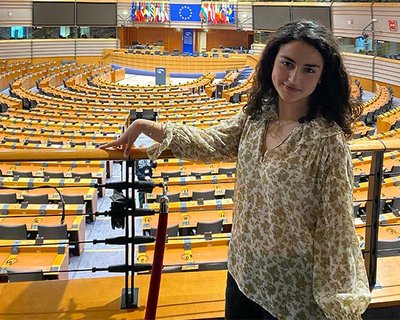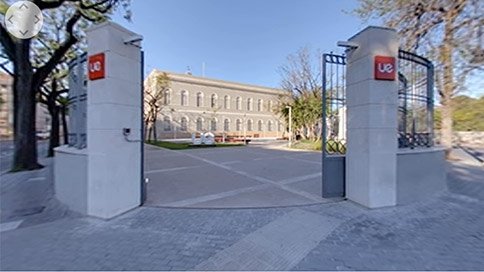-50% Discount on place reservation for 26/27 intake until February 28th!
Master in International Relations
The Master in International Relations in Valencia is a 10-month programme designed to equip students with the skills and knowledge to succeed in the world of international politics, whether that be in government bodies, NGOs, or other international organisations.
The Master in International Politics has been designed and is taught by leading experts in their field. The curriculum covers many areas of the complex issues of international relations today, such as diplomacy, conflict resolution, and foreign policy. With an eminently practical approach, over the course of the programme, which consists of 60 ECTS, you will have the chance to complete work placements at embassies, NGO’s and international organisations, gaining real-world experience and improving key skills such as communication, leadership and strategic thinking.
*Degree positively verified by the Council of Universities, pending authorization for implementation and official recognition by the Council of Ministers, as well as registration in the RUCT.
Official degree issued by Universidad Europea de Valencia
| Campus-based | Classes in English | Valencia | 10 months, 60 ECTS | Start: 16 oct. 2026 | School of Social Sciences and Communication |
91%
Our students find employment in less than 12 months.
55%
You'll live in a diverse environment that is more multicultural than that of other universities.
3.600
UEV has a multitude of educational cooperation agreements with other centres.
Students carry out a practical exercise simulating UN procedures in a debate held on UN premises.
noStudents carry out a practical exercise simulating UN procedures in a debate held on UN premises.
Study plan
Study plan structure
MODULE | SUBJECT | CREDITS |
MODULE 1 | GEOPOLITICS AND GEOECONOMICS: STATE-OF-THE-ART | 12 |
1.1. | Advanced Geopolitics | 6 |
1.2. | Advanced Geoeconomics | 6 |
MODULE 2 | SOFT SKILLS FOR SUSTAINABLE LEADERSHIP | 12 |
2.1. | Analytical skills - decision making skills | 4 |
2.2. | Problem-solving skills - Conflict Resolution | 4 |
2.3. | Adaptability - Creativity | 3 |
2.4. | Case of (Poli)Crisis Management | 1 |
MODULE 3 | STRATEGIES AND TACTICS | 12 |
3.1. | Workshop of International Negotiations | 5 |
3.2. | Security and Defense: (re)organizations | 5 |
3.3. | UN Simulation | 2 |
MODULE 4 | KEY REGIONAL APPROACHES | 12 |
4.1. | Chinese and Indian Challenges | 3 |
4.2. | South Global vs.West | 3 |
4.3 | Middle East and Latam: new actors, new stakes | 3 |
4.4 | Europe with or without US | 3 |
MODULE 5 | DIPLOMACY 360º | 12 |
5.1. | Digital Diplomacy and Artificial Intelligence | 3 |
5.1. | Sustainability Diplomacy | 3 |
5.1. | Humanitarian Diplomacy | 3 |
5.2 | Scientific Diplomacy | 2 |
MODULE 6 | TFM | 6 |
6 | Master's thesis with international jury | 6 |
Employability
Career opportunities
A Master's Degree in International Relations can open up a wide variety of career opportunities, as it prepares graduates for roles involving international affairs, diplomacy, political analysis and other related fields.
Diplomacy and foreign service.
International organisations.
Non-Governmental organisations (NGOs).
Policy analysis and consultancy.
International trade and economic development.
International security.
International journalism.
Education and research.
Multinational companies.
Conflict resolution and peacebuilding.
Admissions
Start your future at Universidad Europea
You can become a student at Universidad Europea in three easy steps.
1
Admission exams
Start your admission process by calling +34 961113845 or request information and our advisors will contact you.
2
Place reservation
Once you have been admitted, secure your place by paying the reservation fee.
3
Enrollment
Submit the required documents to formalise your enrollment.
Admissions
Start your future at Universidad Europea
You can become a student at Universidad Europea in three easy steps.
1
Admission exams
Start your admission process by calling +34 922046901 or request information and our advisors will contact you.
2
Place reservation
Once you have been admitted, secure your place by paying the reservation fee.
3
Enrollment
Submit the required documents to formalise your enrollment.

Come and see the campus
Get to know the facilities and discover why Universidad Europea is made for you.
Faculty
Teaching staff
- PhD. Frédéric Mertens de Wilmars
He is the Coordinator of the Bachelor’s Degree in International Relations, SDG Director of UEV, and Senior Lecturer in Constitutional Law and Political Sc. He is Accredited Doctor in Law from University of Valencia (Spain) and graduated from Catholic University of Louvain (Belgium). He holds a DEA in European Law from the University of Aix-Marseille (France). He is a guest professor at numerous foreign and Spanish universities and collaborates as an expert with international institutions such as European Commission, Council of Europe and United Nations agencies. His research and publications focus on European Governance, Human Rights and Gender Equality. One research sexennial.



